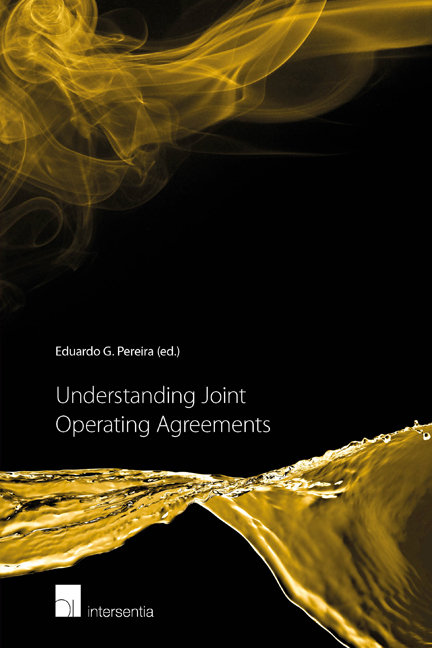Book contents
- Frontmatter
- Contents
- List of Abbreviations
- List of Authors
- Introduction
- PART I CONSIDERATIONS PRIOR TO ENTERING INTO A JOA
- PART II SETTING UP A JOA
- PART II.A GENERAL CONSIDERATIONS
- PART II.B CONTROL OF OPERATIONS AND EXPENDITURES
- 15 Authorising Work and Contracts: How is the North American System Unique?
- 16 Making the Default Mechanism Fair and Enforceable
- 17 The Relationship and Challenges between a Th ird Party Operator, the Joint Operating Company and JOA
- 18 Accounting Procedure: Can the Operator Make a Profit? How Can a Non-Operator Control the Costs of the Consortium?
- 19 Senior Supervisor, Financial Cap and Other Restrictions on the Operator's Liabilities and their Implications
18 - Accounting Procedure: Can the Operator Make a Profit? How Can a Non-Operator Control the Costs of the Consortium?
from PART II.B - CONTROL OF OPERATIONS AND EXPENDITURES
Published online by Cambridge University Press: 15 December 2017
- Frontmatter
- Contents
- List of Abbreviations
- List of Authors
- Introduction
- PART I CONSIDERATIONS PRIOR TO ENTERING INTO A JOA
- PART II SETTING UP A JOA
- PART II.A GENERAL CONSIDERATIONS
- PART II.B CONTROL OF OPERATIONS AND EXPENDITURES
- 15 Authorising Work and Contracts: How is the North American System Unique?
- 16 Making the Default Mechanism Fair and Enforceable
- 17 The Relationship and Challenges between a Th ird Party Operator, the Joint Operating Company and JOA
- 18 Accounting Procedure: Can the Operator Make a Profit? How Can a Non-Operator Control the Costs of the Consortium?
- 19 Senior Supervisor, Financial Cap and Other Restrictions on the Operator's Liabilities and their Implications
Summary
INTRODUCTION
The accounting procedure is an integral part of a JOA. It provides for the types and categories of expenditure that can be charged to the joint account in the course of carrying out the petroleum operations. It mainly covers the management of billing facilitation of cash calls to the joint venture partners for the payment of costs and expenditures incurred during the prior month, indicating by appropriate classification the nature, the budget category and the apportionment of such costs to each party. It will specify that the accounting treatment will be based on an accrual basis whereby the costs incurred in the current or prior month shall be paid within a certain period (typically thirty days from the date of billing). It will also define the way in which the operator will charge the non-operator, the general and administrative costs that include overheads borne by the operator and possibly its parent company. These are the areas that will be the subject of discussion of this chapter.
FUNDAMENTAL PRINCIPLE
In a typical oil and gas joint venture parties will choose one of the parties to become the operator that will carry out the petroleum operations in accordance with the terms and requirements of the production sharing contract, concession or licence. In carrying out the petroleum operations the party that has been chosen as the operator will adhere to the terms and conditions of the JOA and the mode of charging the non-operator based on the agreed accounting procedure. The fundamental principle is that in carrying out the petroleum operations the operator shall neither make a gain nor suffer a loss by reason of the fact that it acts as the operator. In consideration of this principle parties will mutually agree that in the event that any of the charging methods are proven unfair or inequitable to the parties, the parties will normally meet in good faith and agree on changes in methods deemed necessary to rectify any unfairness or inequity. The accounting procedure will typically provide that there shall be no duplications of charges or revenues in the accounts under the JOA. Further, in the event of a conflict between the provisions of the accounting procedure and the provisions of the JOA, the JOA provisions shall prevail.
- Type
- Chapter
- Information
- Understanding Joint Operating Agreements , pp. 363 - 372Publisher: IntersentiaPrint publication year: 2016

